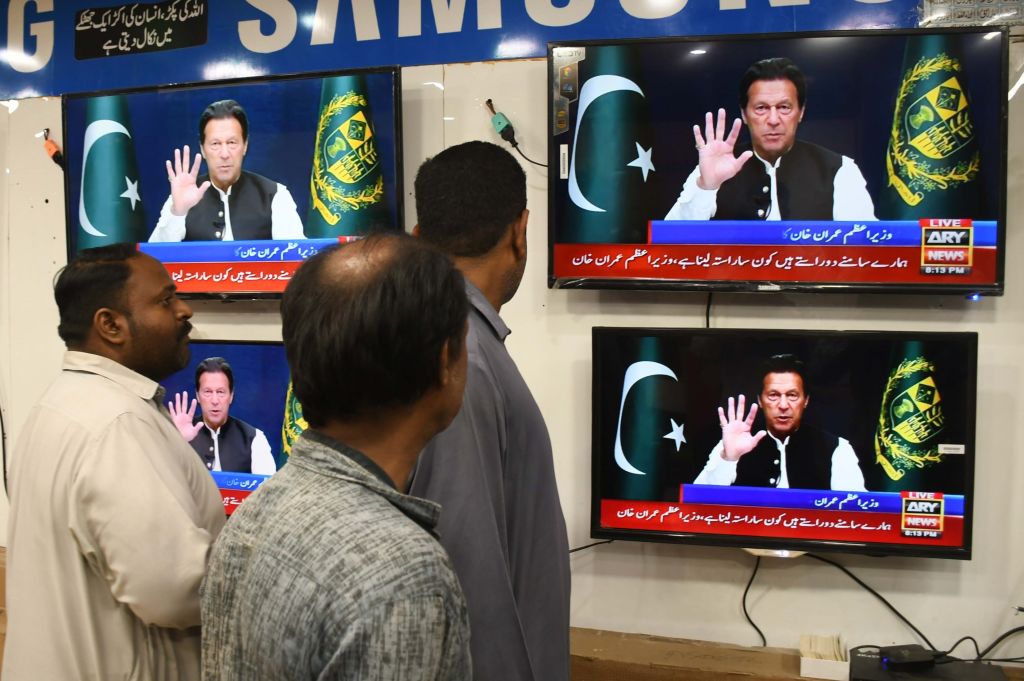Pakistan after the fall of Imran Khan
Posted By Claude Rakisits on April 12, 2022 @ 06:00

Imran Khan’s less than four-year stint as prime minister of Pakistan came to an abrupt end with his defeat in a vote of no confidence [1] in the National Assembly on 9 April. His departure marked the end of a month of high political drama in Islamabad.
Pakistan’s political crisis began on 8 March when the opposition, led by Shahbaz Sharif, the head of the Pakistan Muslim League—Nawaz, tabled a motion of no confidence in the prime minister. Skilfully using parliamentary tactics, Khan and his party, the Pakistan Movement for Justice (PTI), managed to delay the vote on the motion until 4 April. And then two hours before the vote, the deputy speaker of the National Assembly dismissed the motion as invalid, claiming that there had been foreign interference in the process. With the motion now removed, the prime minister called a snap election, following his request to the president to dissolve the National Assembly.
The opposition rejected these parliamentary manoeuvrings and asked the Supreme Court to make a ruling on their legality. After four days of deliberations, a panel of five judges unanimously ruled [2] that the dismissal of the no confidence motion was unconstitutional, as were the dissolution of the National Assembly and the calling of the election. The vote on the motion of no confidence would go ahead. This coup de theatre was unexpected; most people believed that the deputy speaker’s decision wouldn’t be overturned.
In front of a massive crowd in Islamabad on 3 April, Khan, clutching a piece of paper, claimed to have proof that the opposition was colluding with the Americans for his removal. The ‘smoking gun’ in his hand was purported to be a memo from Pakistani diplomats in Washington about a meeting they’d had on 7 March with the US assistant secretary of state for South and Central Asia, Donald Lu, in which he had allegedly told them Khan was the obstacle to any improvement in US–Pakistan relations. While the White House hasn’t denied that the meeting occurred [3], it has rejected [4] any US attempt at regime change in Pakistan.
Anti-Americanism is always a great crowd-pleaser in Pakistan, but even the massive show of popular support for Khan wasn’t enough to save him from defeat. Having failed to win a majority in parliament in elections in 2018, Khan had had to cobble together a loose coalition of minor parties for his political survival. However, as his political fortunes began to turn—principally due to poor economic management, including double-digit inflation and a drop in per capita income—these parties abandoned him. Shenanigans and dirty deals were reportedly used to get members of the PTI to switch to the opposition on the day of the vote.
The military calls the shots in Pakistan; the opposition’s move against the prime minister would not have succeeded if it hadn’t been for the military’s abandonment of Khan. In the 2018 elections, it was an open secret that the former cricket hero was the army’s favourite candidate. But the generals soon discovered that Khan was less docile than they thought he’d be. A very public fracas over the appointment of a new military intelligence chief—which went to Chief of the Army Staff General Qamar Bajwa—was a turning point in the deteriorating relationship.
However, what made the generals particularly uncomfortable was Khan’s increasingly anti-American rhetoric. His referring to the Taliban taking over in Kabul from the American-backed government in August 2021 as Afghanistan’s ‘breaking the shackles of slavery [5]’ would have been especially irksome to the men in uniform.
More recently, Khan’s visit to Moscow [6] on the day Russian tanks were rolling into Ukraine was probably a bridge too far. This was compounded by his refusal to call Russia’s ‘special military operation’ an invasion and his government’s abstention on a UN General Assembly resolution condemning Russia’s actions.
However, at a high-level security conference in Islamabad on 2 April, Bajwa set the record straight by stating [7] that the US and Pakistan had had a long strategic relationship and America was Pakistan’s most important export market. Pointedly, he referred to Russia’s ‘invasion’ and stressed that ‘Russia’s aggression against a smaller country cannot be condoned’. The prime minister’s political fate was sealed.
So, with Shahbaz Sharif—who happens to be the brother of Nawaz Sharif, the three-time prime minister of Pakistan—now at the helm, will US–Pakistan relations improve? Possibly, but, if so, certainly nothing dramatic will happen because Pakistan’s foreign policy drivers are not about to change. Islamabad will continue to deepen its long-term strategic and military relationship with China. It may, however, go easy on its recently newly found friendship with Russia. Importantly, Bajwa has indicated [8] that he’d be willing to talk to India to try to resolve the Kashmir issue. That’s good news.
Khan has made it clear he has no intention of taking his defeat lying down, stating that he won’t ‘accept an imported government [9]’. He will undoubtedly organise massive rallies and whip up his millions of supporters in the lead-up to the next election in July 2023. Whether that will be sufficient for him to reclaim the premiership is a moot point.
However, one thing is certain now that Khan has been removed from power: there will be less-visceral anti-American rhetoric emanating from Islamabad. But will that be enough for President Joe Biden to finally make that long-awaited phone call to the new prime minister, the one Khan never received? Probably not.
Article printed from The Strategist: https://www.aspistrategist.org.au
URL to article: https://www.aspistrategist.org.au/pakistan-after-the-fall-of-imran-khan/
URLs in this post:
[1] defeat in a vote of no confidence: https://www.dawn.com/news/1684168/imran-khan-loses-no-trust-vote-prime-ministerial-term-comes-to-unceremonious-end
[2] unanimously ruled: https://www.dawn.com/news/1683857/supreme-court-restores-national-assembly-orders-no-confidence-vote-to-be-held-on-saturday
[3] hasn’t denied that the meeting occurred: https://www.dawn.com/news/1683520
[4] rejected: https://www.geo.tv/latest/408759-threat-letter-white-house-spurns-pm-imran-khans-allegation
[5] breaking the shackles of slavery: https://www.geo.tv/latest/365546-afghanistan-has-broken-shackles-of-slavery-pm-imran-khan
[6] Khan’s visit to Moscow: https://www.aspistrategist.org.au/pakistans-fence-sitting-on-ukraine-is-being-noticed-internationally/
[7] Bajwa set the record straight by stating: https://www.youtube.com/watch?v=EG5LM_X7_G4
[8] Bajwa has indicated: https://thekashmirpress.com/2022/04/05/pakistan-army-ready-to-discuss-four-point-formula-to-resolve-kashmir-report/
[9] accept an imported government: https://www.aljazeera.com/news/2022/4/9/pakistan-prime-minister-imran-khan-no-confidence-vote
Click here to print.